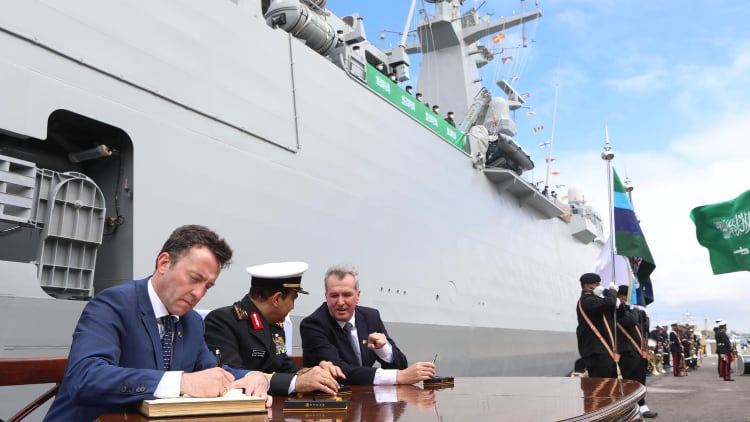The Diplomat
Navantia delivered yesterday to the Royal Saudi Navy the first of the five corvettes built for the Arab country at its shipyards in the Bay of Cadiz, in a ceremony held at the facilities of the La Carraca Naval Base in San Fernando.
The ceremony for the delivery of the 546th construction, named Al-Jubail, was attended by the Commander of the Saudi Navy, Vice Admiral Fahad Bin Abdullah Al-Ghofaily; the Admiral Chief of Staff of the Navy (Ajema), Antonio Martorell Lacave; the State Secretary for Trade, Xiana Méndez; the Secretary General for Industry and SMEs, Raúl Blanco and the CEO of SAMI (Saudi Arabian Military Industries), Walid Abukhaled; and the President of Navantia, Ricardo Domínguez, among others.
The corvette Al-Jubail has been delivered to the Saudi Navy three years after the cutting of its first plate (January 2019) and after having successfully passed the sea trials carried out in the waters of the Bay of Cadiz during the last few months. These tests have verified the proper functioning of both the platform and the various systems, with the aim of demonstrating compliance with the requirements specified in the ship’s contract.
The event took place in accordance with military protocol. The Joint Inspection Commission (formed by members of the Royal Saudi Navy and Navantia) went on board the corvette to carry out the mandatory inspection. At the end of the inspection, the ship’s flag was raised, after which the Saudi Navy transferred command of the corvette to the commander of Al-Jubail. The president of Navantia presented Vice Admiral Al-Ghofaily with the ship’s bell as an institutional gift.
At the ceremony, Xiana Méndez expressed the support of the Ministry of Industry, Trade and Tourism to the Spanish naval industry and took the opportunity to reiterate the announcement made by the Prime Minister, Pedro Sánchez, that Spain will meet its goal of allocating 2% of GDP to defence, “thus contributing -she said- to European and Atlantic security, while reinforcing the security of our country”.
The president of Navantia, Ricardo Domínguez, declared his pride in “the great work carried out by the shipyard, the cooperation received from all the contractors and suppliers, and the collaboration of the officers dedicated to the programme both in San Fernando and Saudi Arabia”. He added that the ship delivered will be “an international benchmark in its class and a clear example of a state-of-the-art product”.
Vice Admiral Al-Ghofaily, for his part, said that this ambitious programme underlines the strong and enduring strategic relations between the two countries and praised Navantia’s commitment to deliver a state-of-the-art corvette on schedule. He indicated that the frigate Al-Jubail is the most technologically advanced surface combat ship to join the Royal Saudi Navy.
SAMI’s CEO said: “This is a proud moment for the Saudi defence industry and for SAMI, and demonstrates our success in partnering with leading global suppliers to serve the Saudi Arabian armed forces. We are confident that HMS AL-JUBAIL will be a key addition to the Kingdom’s defence capability”.
The corvette AL-JUBAIL has a length of 104 metres, a beam of 14 metres and is capable of carrying a total of 102 crew and passengers. The contract for the construction of five corvettes came into force in November 2018 and, since the launching of this first unit (in July 2020), Navantia has already launched the five units with a cadence of four months between each of them, which means achieving this milestone in a record time of three years.
The corvettes are based on the AVANTE 2200 design, adapted to Saudi Arabia’s requirements, offering advanced performance, excellent seakeeping, high survivability and the ability to operate at extreme temperatures.
The contract involves an overall workload of around seven million hours, 6,000 jobs over five years. Of these, more than 1,100 are direct employees, more than 1,800 employees of collaborating industry (more than a hundred companies are involved) and more than 3,000 indirect employees generated by other suppliers.
The programme, whose last vessel is due for delivery in 2024, includes, in addition to construction, Life Cycle Support for five years from the delivery of the first vessel, with an option for a further five years.







